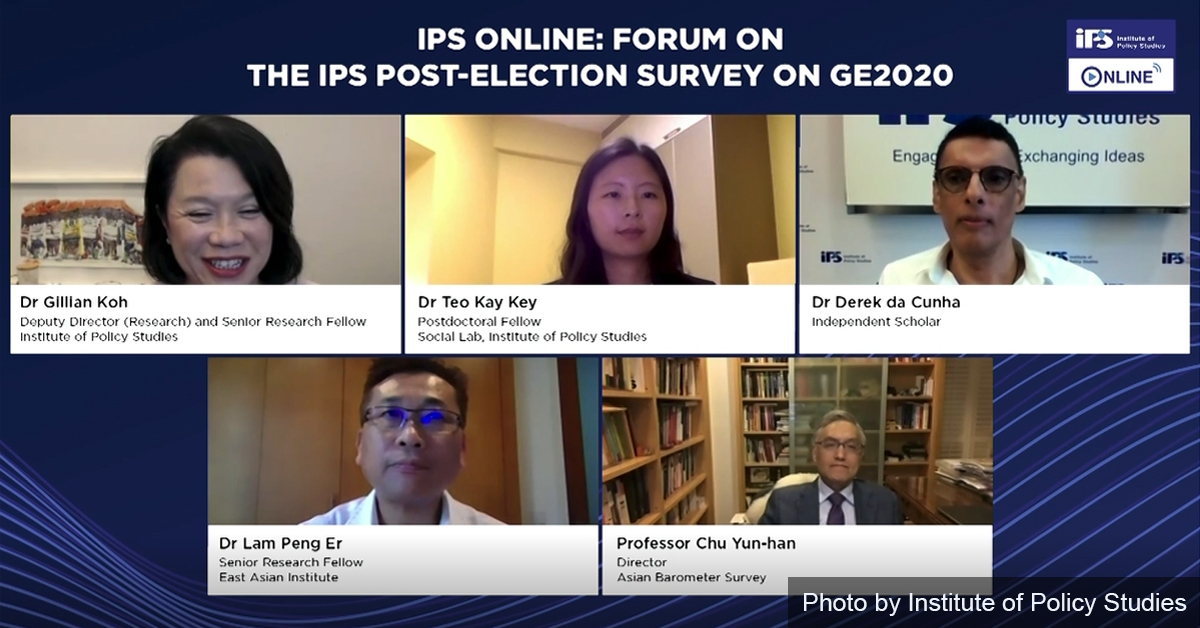
On 1 October, IPS Social Lab Postdoctoral Fellow Dr Teo Kay Key presented the 2020 edition of IPS’ Post-Election Survey at a forum moderated by IPS Deputy Director (Research) and Senior Research Fellow Dr Gillian Koh.
Dr Teo was part of the research team led by Dr Koh which also comprised IPS Research Associate Mr Damien Huang and Associate Professor Dr Tan Ern Ser, Academic Adviser of Social Lab.
IPS had conducted similar surveys after the general elections of 2006, 2011 and 2015.
After Dr Teo’s presentation, there was a discussion by a panel of political experts. They were independent scholar Dr Derek da Cunha; Dr Lam Peng Er, Senior Research Fellow, East Asian Institute; and Professor Chu Yun-Han, Distinguished Research Fellow at the Institute of Political Science, Academia Sinica and Professor of Political Science at National Taiwan University.
The 2020 survey results showed that “good and efficient government” continued to be the top priority for respondents. However, compared to 2015, jobs and cost of living, as well as the desire for diverse views in Parliament, saw the highest increase – by 9% – in the “very important” category, among the full range of 15 issues listed.
The Government’s handling of the COVID-19 situation was also among the top three issues — 89% of all respondents said it was “important’’ or “very important’’.
The study found that while the People’s Action Party (PAP) was still seen as the most credible political party, the percentage of respondents who regarded it as so had declined since the last general election. Conversely, the proportion of respondents who saw the Workers’ Party (WP) as credible saw a slight increase. The Progress Singapore Party (PSP), which contested for the first time in 2020, was rated the third most credible party by mean scores of the responses.
The way voters informed themselves of election issues also saw a shift, as the Internet overtook television, newspapers and rallies as the communication platform which most voters turned to for information. More details about the survey findings can be found in the executive summary and presentation slides.
Commenting on the consistent trend of the higher socio-economic classes and the young supporting the idea of political pluralism, Dr Lam suggested that Singapore may be moving away from the “one-party system” where Parliament and local politics are dominated by the PAP, to a “one-and-a-half-party system”. This would be similar to the political system in Japan from 1955 to 1993, where the key opposition party garnered half the number of seats that the dominant Liberal Democratic Party did at each election. This means that even as the PAP continues to hold the most power, the presence of a strong opposition party such as the WP in Parliament would be the “new normal” for Singapore. He added that the PAP cannot afford to be complacent in its dominant role, and future elections may see opposition parties winning more constituencies.
Dr da Cunha analysed the strategies taken by the different parties during the election. He felt that the WP had successfully established itself as a rational, responsible and respectable party. It understood that voters were prepared to accept a moderate opposition party in Parliament, but not necessarily those perceived as being more radical.
In answer to a question about what sorts of electoral and political reforms might be needed to make the political system more responsive and legitimate in citizens’ eyes, he said two things: First, that electoral boundaries should be announced a year ahead of general elections. Second, more use should be made of Select Committees, similar to those found in the United Kingdom’s parliamentary system. These are channels for expressing views across society and among many stakeholders, and will foster participatory democracy. Dr Koh noted that the newly-designated Leader of the Opposition, Mr Pritam Singh, Secretary-General of the Workers’ Party, had also stated that he would promote the use of such committees. Dr Lam suggested that Singapore could learn from the parliamentary systems of Japan and South Korea as well.
Putting the Singapore elections in a regional context, Professor Chu shared findings from the Asian Barometer Survey, which found that while the majority of East Asian citizens supported democracy on the whole, they also had ambivalent views on whether it is an effective system in all circumstances.
In Singapore, while respondents were likely to say that there were problems with democracy, it was still seen as the best form of government. They were also more likely than people in Taiwan, Korea and Japan to say that they were proud of their system of government, and that they would support it even if it ran into problems.
Prof Chu noted that like other East Asians, it was the substantive aspects of democracy, rather than the procedural and rights-based aspects of it that mattered.
In response to questions about improving the responsiveness of government and the political legitimacy of the regime, Professor Chu added that government agencies should make use of big data to interpret and predict voter concerns and sentiments, and that such data should be accessible publicly so that other political parties could do the same too.
This forum is the first in a series of three on the Singapore General Election 2020. The second forum, on the role of the Internet and media use, is on 8 October; the final forum on 22 October will feature politicians from the People’s Action Party, Workers’ Party and Progress Singapore Party sharing their vision and plans as they work towards the next general election.
